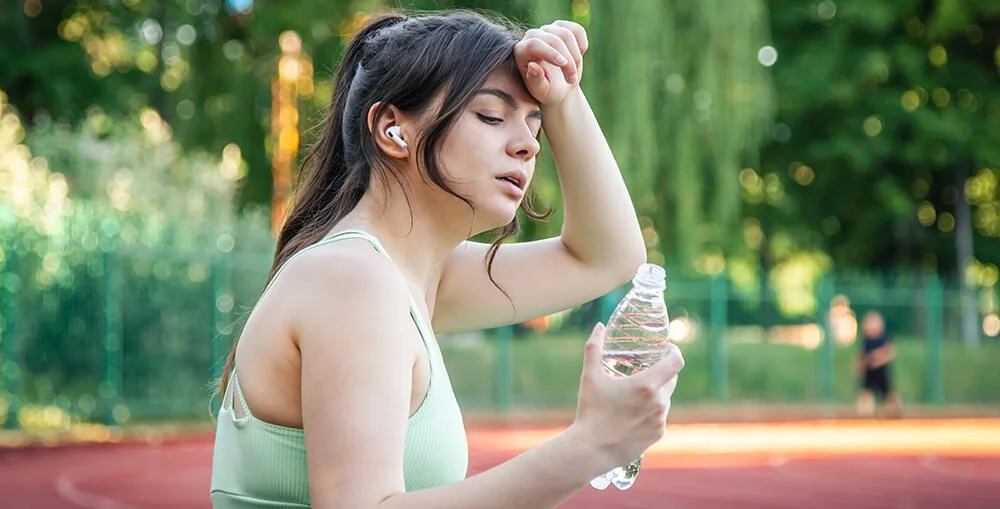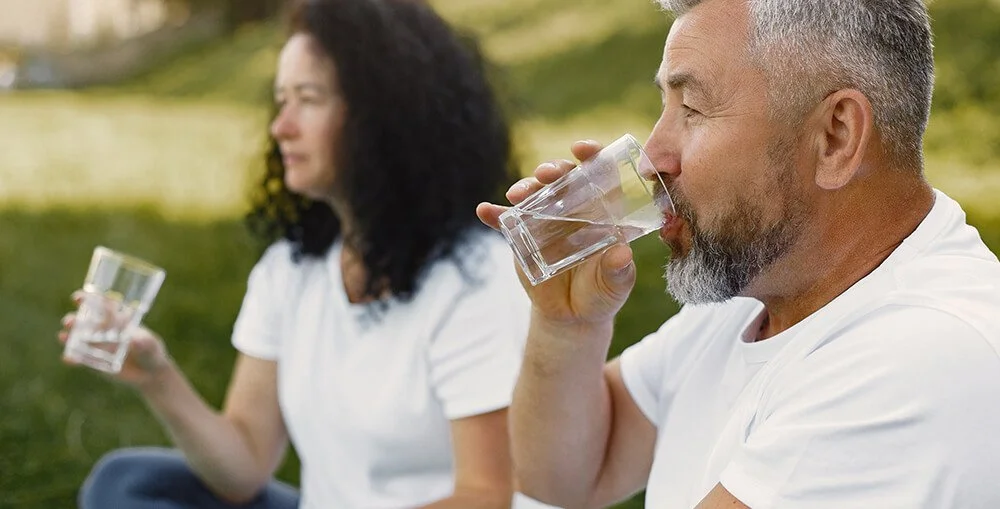Beat the Heat: Staying Refreshed on Hot Summer Days
Table of Contents Show
Quick Summary
Ready to tackle summer heat during your outdoor activities? This guide offers essential strategies for staying refreshed and safe in hot weather. Learn the importance of proper hydration and get practical tips for summer walks. We cover appropriate clothing choices, signs of heat sickness, and effective cooling methods.
For both seasoned walkers and fitness beginners, these heat management techniques are crucial for safe summer exercise. Discover hydration strategies and how to recognize warning signs, ensuring you can beat the heat and enjoy your summer walks safely.
While the sun has not come out fully yet! We are approaching the good weather, and if it is anything like previous summers, we are looking for another hot summer!
When the sun is shining, the birds are singing, it's a perfect day for a walk!
But at times, the heat can be stifling.
This is never fun, but while it should not stop you from enjoying your daily exercise or running around Stanley Park, it presents certain risks that we sometimes do not consider. High temperatures can increase dehydration, heat exhaustion, and heatstroke risks.
Staying properly hydrated and taking measures to keep your body cool is essential for safe summer walks. This is why we have put together this article, hoping to provide a reminder or share new tips to help you stay refreshed and enjoy your hot weather outings safely.
The Importance of Staying Hydrated
We all know it to be true, but how often do we head out the door bringing a bottle of water or believe everything will be fun until we get home or find a local shop?
Proper hydration is absolutely vital when exercising in hot weather.
As your body temperature rises during physical activity, you lose fluids through increased sweating. If those fluids aren't replaced, dehydration can set in. Even mild dehydration of just 1-2% of body weight can drain your energy levels and impair exercise performance.
Dehydration reduces blood volume, making the heart work harder to circulate blood and deliver oxygen to working muscles. This can lead to muscle fatigue, increased body temperature, and higher perceived exertion during exercise. Severe dehydration increases the risk of dangerous heat illnesses like heat exhaustion and heatstroke.
”To prevent dehydration, it is recommended that people drink 4 to 8 ounces of fluid every 15 to 20 minutes during exercise,” Dr. Eby says from Mass General Brigham.
“If you are participating in moderate activity in a climate that isn’t very warm, you may be able to consume the lower end of that spectrum — 4 ounces every 20 minutes. High-intensity exercise in the heat might require the higher end of that spectrum — 8 ounces every 15 minutes.”
In addition to replacing fluids, it's also important to replenish electrolytes like sodium and potassium that are lost through excessive sweating.
Sports drinks containing electrolytes can be helpful for intense outdoor exercise, but watch out for their high sugar content.
Foods like bananas, yogurt, and electrolyte tabs or powders are healthier options to maintain proper electrolyte balance.
How Do You Stay Fresh in Hot Weather All Day?
Now that we've discussed why proper hydration is crucial for hot-weather walks let's explore specific strategies for staying fresh all day.
Applying these hydration tips before, during, and after your summer outings will keep you energized and prevent dehydration from dampening your exercise. To ensure you remain refreshed and hydrated, follow these essential tips:
-
Begin your hydration journey even before you step foot outside. Drink a glass of water or a hydrating beverage about 30 minutes before your walk.
This pre-walk hydration primes your body by replenishing fluids and preparing you for the upcoming exertion. To kickstart your hydration routine, opt for cool water, herbal infusions, or electrolyte-rich drinks. -
Remember to carry a water bottle and take regular sips along the way. Aim to drink small amounts of water every 15-20 minutes to maintain hydration levels. Investing in a reusable water bottle with a built-in straw or sipper makes staying hydrated on the go easier.
Additionally, if you're planning a longer walk or engaging in more intense physical activity, consider bringing a hydration backpack or waist belt with a water reservoir for convenient access. -
Sports drinks can provide an extra boost of hydration for extended walks or intense physical activity.
These beverages contain electrolytes like sodium, potassium, and magnesium, which help replenish the minerals lost through sweating. Sports drinks also provide carbohydrates, contributing to maintaining energy levels during prolonged exercise.
However, sports drinks are unnecessary for shorter walks or moderate activity. Reserve them for more demanding outings where you anticipate increased fluid and electrolyte losses. -
Your choice of clothing can significantly impact your body's ability to stay cool and comfortable. Opt for light-coloured, loose-fitting garments made from breathable fabrics like cotton or moisture-wicking materials.
These fabrics allow air circulation, facilitate sweat evaporation, and prevent excessive heat buildup. Remember to wear a wide-brimmed hat to shield your face and scalp from direct sunlight.
Apply sunscreen generously to exposed skin and wear sunglasses to protect your eyes from harmful UV rays.
| Hydrating Summer Exercises & Walks Essentials | |
|---|---|
| ✓ Reusable water bottle | ✓ Sun hat and sunglasses |
| ✓ Sunscreen SPF 30+ | ✓ Light, breathable clothing |
| ✓ Cooling towel | ✓ Handheld misting fan or spray bottle |
Don't wait until you're thirsty: Thirst is a sign your body is already dehydrated.
Signs of Heat Sickness and Dehydration
Even with proper hydration strategies, it's important to recognize the warning signs that your body is overheating or dehydrating during hot weather exercises.
Catching these early symptoms can prevent progression to more severe heat illness. Be mindful of signs indicating heat sickness or dehydration. Take a look at the list of symptoms that can indicate heat-related issues:
| Signs of Dehydration | |
|---|---|
| Excessive thirst | Dry mouth |
| Headache | Dizziness or lightheadedness |
| Dark yellow urine | Muscle cramps |
| Signs of Heat Exhaustion | |
|---|---|
| Heavy sweating or rapid heartbeat | Cold, clammy skin |
| Fatigue or weakness | Nausea or vomiting |
| Muscle cramps | Headache |
If you experience any of these symptoms, immediately stop your walk and move to a shaded or air-conditioned area. Rehydrate with water or an electrolyte drink.
Cool your body by applying wet towels or taking a cool shower. Seek medical attention if symptoms persist for more than an hour. The most serious form of heat illness is heatstroke, which requires emergency treatment. Signs include:
Body temperature above 103°F
Skin that is hot, red, and dry
Rapid, strong pulse
Possible unconsciousness
If heatstroke is suspected, call 911 immediately and try to lower the person's body temperature with whatever cooling methods are available until help arrives.
Why Do I Feel So Tired on Hot Days?
Feeling exhausted on hot days is a common experience, and there are several physiological reasons behind this fatigue:
-
Your body works harder to regulate its temperature on hot days. To cool down, your heart pumps more blood to your skin's surface, increasing your heart rate and putting extra strain on your cardiovascular system. This additional effort can leave you feeling tired.
-
High temperatures cause increased sweating, which can lead to dehydration if fluids aren't adequately replaced. Even mild dehydration can cause fatigue, headaches, and difficulty concentrating.
-
Sweating doesn't just deplete water; it also reduces your body's electrolyte levels. These minerals are crucial for muscle and nerve function, and an imbalance can contribute to feelings of weakness and tiredness.
-
Hot weather can interfere with your sleep quality, especially if your sleeping environment isn't adequately cooled. Poor sleep naturally leads to daytime fatigue.
-
Your body's metabolic rate increases in hot weather as it works to maintain a stable internal temperature. This heightened metabolic activity requires more energy, potentially leaving you feeling drained.
-
Extended time in the sun can be physically taxing. UV radiation can cause cellular damage, and your body expends energy repairing this damage, which can contribute to feelings of tiredness.
-
Heat can affect your body's hormone levels, particularly cortisol (the stress hormone). These fluctuations can impact your energy levels and mood.
Understanding these factors can help you take proactive steps to manage your energy levels on hot days. Staying hydrated, seeking shade, maintaining a cool environment, and adjusting your activity levels can all help combat heat-induced fatigue.
If you find yourself consistently exhausted during hot weather, it's worth consulting with a healthcare professional. At West End Wellness, we can provide personalized strategies to help you maintain your energy and overall well-being, even when the temperature soars.
Sip all day, every day: Make a habit of taking small, frequent sips of water!
How Do You Keep Energy In Hot Weather?
Hot weather can significantly impact your body's energy levels and overall health.
When temperatures rise, your body works harder to maintain its core temperature, which can lead to fatigue and decreased energy. This extra effort can strain your cardiovascular system, affect your body's fluid balance, and alter your metabolism.
From a health perspective, maintaining energy in hot weather is crucial for several reasons:
Preventing heat-related illnesses: Fatigue can be an early sign of heat exhaustion or dehydration.
Supporting bodily functions: Adequate energy levels help your body regulate temperature more effectively.
Maintaining physical and mental performance: Heat-induced fatigue can impair cognitive function and physical capabilities.
Preserving overall well-being: Consistent energy levels contribute to better mood and quality of life, even in challenging weather conditions.
Understanding these health implications highlights the importance of proactive energy management in hot weather. Here are some effective strategies to keep your energy up when the temperature rises:
Stay hydrated: Drink plenty of water throughout the day. Dehydration can lead to fatigue, so keep a water bottle handy.
Eat light, refreshing meals: Opt for foods high in water content like fruits and vegetables. Heavy meals can make you feel sluggish.
Time your activities wisely: Schedule more strenuous tasks for cooler parts of the day, typically early morning or evening.
Take regular breaks: If you're active outdoors, take frequent breaks in shaded or air-conditioned areas to prevent overheating.
Dress appropriately: Wear loose-fitting, light-coloured clothing made from breathable fabrics to help your body regulate temperature.
Stay cool: Use fans, take cool showers, or apply a cool, damp cloth to your neck and wrists to lower your body temperature.
Get adequate sleep: Hot weather can disrupt sleep patterns. Ensure your sleeping area is cool and comfortable for restful nights.
Limit caffeine and alcohol: While tempting, these can contribute to dehydration. Stick to water and electrolyte-rich beverages.
Practice relaxation techniques: Heat can be stressful. Engage in activities like meditation or deep breathing to maintain mental energy.
Supplement wisely: Consider electrolyte supplements if you're sweating excessively, but consult with a healthcare professional first.
Remember, everyone's tolerance to heat differs. Listen to your body and adjust these strategies as needed. If you're concerned about your energy levels in hot weather, don't hesitate to consult with one of our wellness experts at West End Wellness for personalized advice.
Learn practical tips, debunk myths, and discover science-backed strategies for optimal hydration.
Conclusion
As we wrap up our guide to staying refreshed on hot summer days, we hope you've gained valuable insights into making your outdoor activities enjoyable and safe.
Your health and well-being are paramount and armed with this knowledge, you're now better equipped to tackle the summer heat.
Let's recap the key takeaways from this article:
Hydration is crucial: Start hydrating before your walk and continue throughout your activity.
Dress appropriately: Choose light-coloured, loose-fitting, breathable clothing.
Time it right: Plan your walks for cooler parts of the day when possible.
Listen to your body: Recognize the signs of heat exhaustion and dehydration.
Be prepared: Carry water, wear sun protection, and know how to cool down quickly if needed.
Remember, staying active in the summer isn't just about enduring the heat—it's about embracing the season safely and joyfully.
Every step you take is a step towards better health, and by following these guidelines, you're ensuring those steps are safe.
We encourage you to start small, gradually acclimating your body to exercise in warmer weather. Pay attention to how you feel, and don't hesitate to adjust your routine as needed.
Your body will thank you for the care and attention you're giving it.
If you have any concerns about exercising in the heat or want personalized advice, our team at West End Wellness is here to support you.
We're committed to helping you achieve your health and fitness goals, regardless of season.
So, lace up those shoes, grab your water bottle, and step out into the sunshine. With these tools in your arsenal, you're ready to make this summer your healthiest and most active yet.
Stay cool, stay safe, and enjoy the beautiful summer days ahead!
If you have any further doubts or questions regarding this subject or another treatment, contact one of our experienced Acupuncturists or Registered Massage Therapists here at West End Wellness Clinic. You can either give us a call or make an appointment.
Disclaimer: Please remember this article is for informational purposes only and should not replace professional medical advice. Please consult a healthcare provider or someone with the correct qualifications before starting any new exercise or treatment program.




